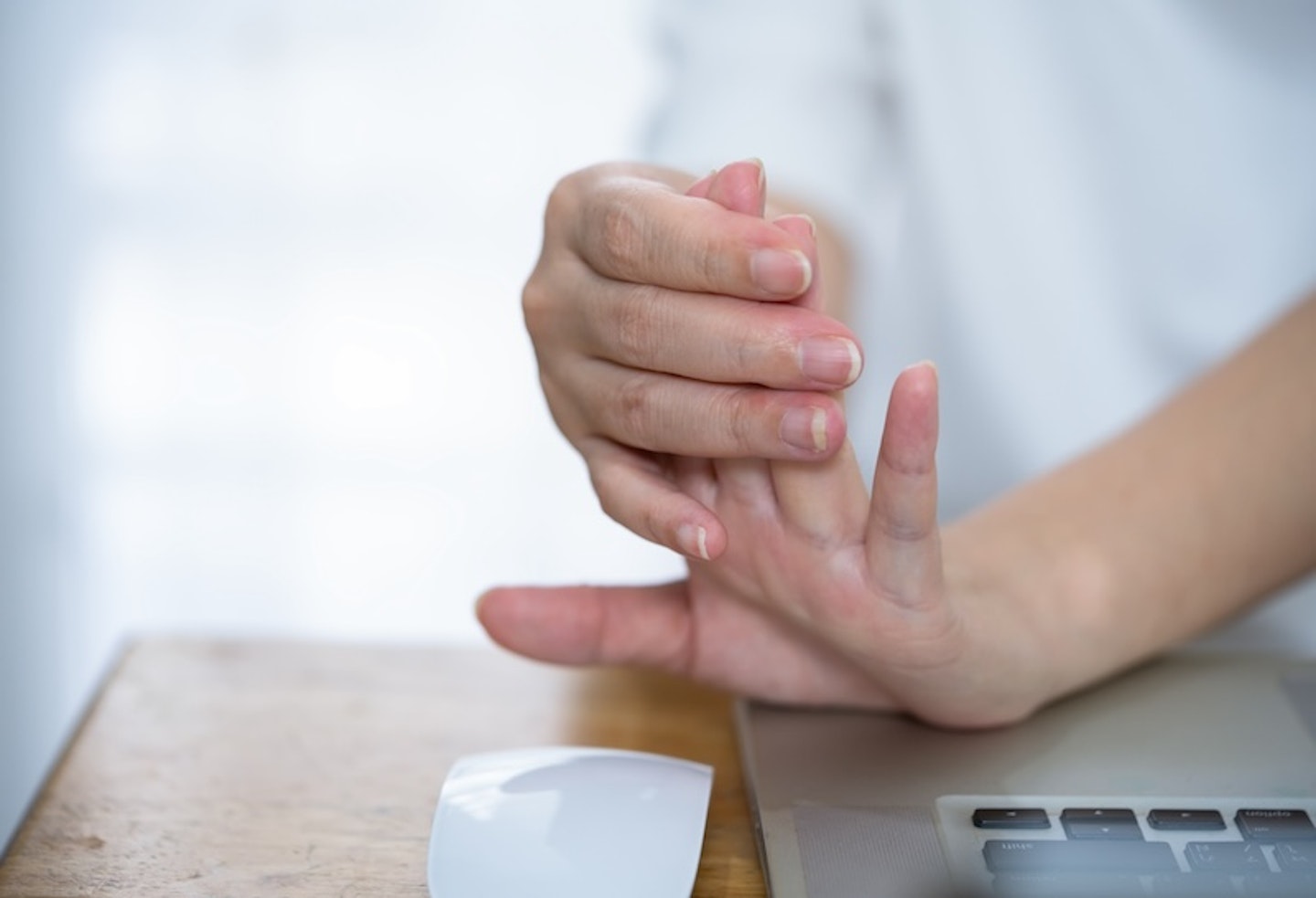While being pregnant can be a wonderful time in your life, you might start to develop aches and pains you haven’t had before. If you’ve noticed pins and needles or tingling in your hands during pregnancy, you might have Carpal Tunnel Syndrome. This relatively common condition can affect anyone but is more common in pregnancy. To help ease the discomfort you might experience, we’ve looked into the symptoms, causes, and exercises for Carpal Tunnel in pregnancy.
What is Carpal Tunnel Syndrome?
While Carpal Tunnel Syndrome can affect anyone, it’s particularly common in pregnancy, with 30-60 per cent of pregnant women affected by the condition, particularly in the third trimester. During pregnancy, there’s more fluid in your body and it tends to accumulate in the extremities – the hands, wrists, feet, and ankles – which is why you might have gone up a shoe size and be dealing with swollen hands and ankles.
This extra fluid can put pressure on the median nerve in your wrist as it travels through a narrow space called the carpal tunnel. As the median nerve controls your thumb and fingers, the pressure on this nerve is what causes tingling hands in pregnancy, pain in the wrist, or numbness in your hands. You might notice weakness in your hands, making it difficult to open tight jars or hold heavy items. If you notice any of these symptoms, talk to your midwife or GP.
What are the symptoms of Carpal Tunnel Syndrome in pregnancy?
According to the NHS, the main symptoms of Carpal Tunnel Syndrome in pregnancy are:
-
Pain in the arm, hand, or fingers
-
Tingling hands or pins and needles in the hand
-
Numb hands
-
Numbness in the hands while sleeping
-
Weakness in the hand or thumbs
-
Swollen hands
-
Symptoms worsen at night
-
Hands feel hot and might look red
The severity of these symptoms can vary between people and are usually worse at night when you might sleep with your wrists bent.
Should you worry about Carpal Tunnel Syndrome?

Carpal Tunnel Syndrome is very common in pregnancy, affecting 30-60 per cent of all pregnant women to varying degrees. While relatively harmless, it can cause pain and difficultly carrying out daily tasks. So if you think you might have Carpal Tunnel Syndrome, it’s worth talking to your midwife or finding ways to minimise the pain and help you deal with the symptoms.
While severe swelling in pregnancy can be a sign of Preeclampsia, having carpal tunnel doesn’t generally mean you have Preeclampsia. According to the NHS, Preeclampsia is high blood pressure and protein in your urine in pregnancy and should be picked up during routine antenatal appointments. As it can cause serious complications, they advise contacting your midwife, GP, or NHS 111 if you have sudden or severe swelling to your face, feet, hands, or ankles, potentially accompanied by headaches, abdominal pain, nausea, and shortness of breath.
What helps with Carpal Tunnel in pregnancy?

If you’ve noticed symptoms of Carpal Tunnel in pregnancy, try to note when the symptoms are worse or what might have aggravated them. This will allow you to change your routine or activities to avoid any that are causing the Carpal Tunnel symptoms to flare up. If you work at a desk, try to adjust your position to place less strain on your wrists, improve your posture, and take regular breaks. You might need to adjust your position so your wrists don’t bend, either by changing the height of your chair, using an ergonomic keyboard or mouse, or trying a keyboard pad with wrist support.
Alternating between hot and cold can help, whether just using ice packs, or placing your hand and wrist in a bowl of hot water for 30 seconds and then the same in cold water, repeating around three times each to aid blood flow.
Elevating your arms or arms will encourage fluid away from the affected area. Perhaps try propping your arm up against a cushion before bed to ease symptoms.
There are a number of exercises for Carpal Tunnel Syndrome in pregnancy and your midwife might be able to recommend exercises that can ease the discomfort and aid movement. Yoga has been shown to help with hand and wrist strength, though we’d recommend checking any exercise with your midwife or doctor first.
You might find it helpful to wear a splint or wrist support to add strength to your wrist and prevent too much strain being placed on the joint. Again, seek advice from your midwife or doctor to get the right one for you.
As the symptoms of Carpal Tunnel Syndrome can be worse at night, it’s important to find the best position to sleep in when pregnant. If possible, try to avoid sleeping on the affected side, and try to keep your wrists straight – this is where a splint can be useful.

How long does pregnancy Carpal Tunnel last?
If you’re experiencing the symptoms of Carpal Tunnel Syndrome in pregnancy, you might be wondering if it will improve after you’ve had your baby. The good news is, in many cases symptoms should improve a few weeks after giving birth as the fluids in your body return to normal. If they continue or are severe, speak to your midwife, doctor, or health visitor.
Should you seek medical attention for Carpal Tunnel Syndrome?
It’s always worth talking to your midwife if you have any concerns during your pregnancy and that includes symptoms of Carpal Tunnel Syndrome. While there’s generally no need to worry, the symptoms can also be related to de Quervain's tendinosis, so seeking medical advice will help find the best treatment and exercises.
Rebecca Lancaster is a Digital Writer for Mother&Baby, drawing on ten years of parenting her two children to help others navigating their own parenting journey. As a freelance writer, she spent ten years working with leading lifestyle brands, from travel companies to food and drink start-ups, and writing everything from hotel reviews to guides to the best British cheeses. She’s particularly interested in travel and introducing her children to the excitement of visiting new places, trying different foods (less successfully) and experiencing different cultures.
